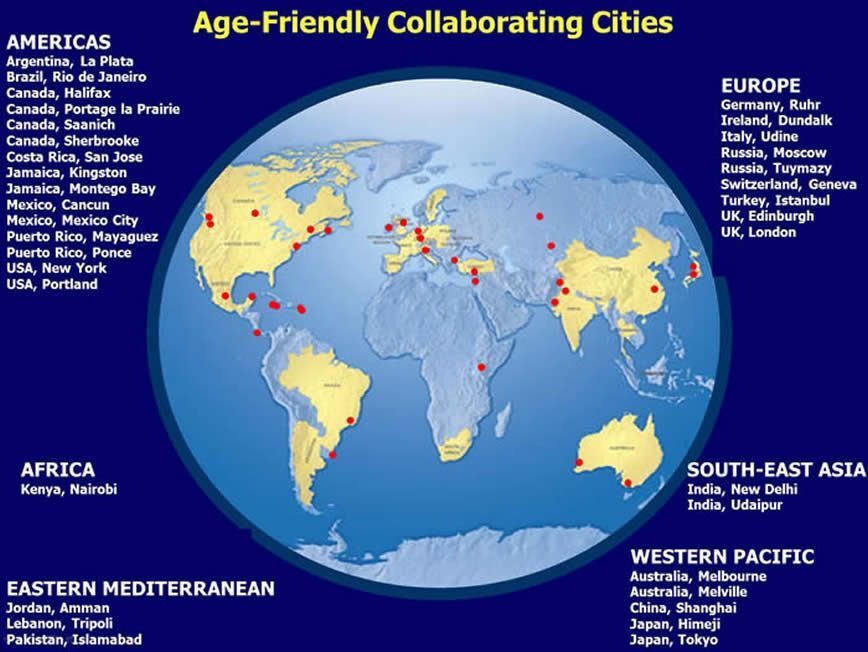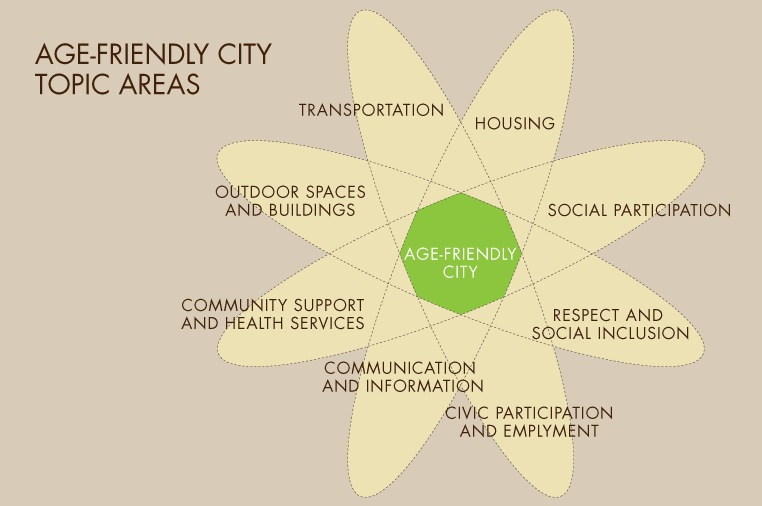
In 2006, the world health organization (WHO) developed a Global Age-Friendly Cities Project. This project brought together cities from around the world that were interested in supporting healthy aging by becoming more age-friendly. These cities gathered information from seniors, senior care providers and other groups and individuals with an interest in age-friendly communities. This information helped to identify eight key areas of community life in which communities can become more age friendly.
The information below about age-friendly cities is adapted from a publication of the World Health Organization: Global Age-Friendly Cities: A Guide, 2007.
For more detailed information about each of the categories included in this outline, please refer to the guide, which includes specific suggestions for creating age-friendly environments under each of the topics.
Outdoor Spaces and Buildings
- Pleasant and clean environment
- Importance of green spaces
- Somewhere to rest
- Age-friendly pavements
- Safe pedestrian crossings
- Accessibility
- A secure environment
- Walkways and cycle paths
- Age-friendly buildings
Transportation
- Availability
- Affordability
- Reliability and frequency
- Travel destinations
- Age-friendly vehicles
- Specialized services for older people
- Priority seating and passenger courtesy
- Transport drivers
- Safety and comfort
- Transport stops and stations
- Taxis
- Community Transport
- Information
- Driving conditions
- Courtesy towards older drivers
- Parking

Housing
- Affordability
- Essential services
- Design
- Modifications
- Maintenance
- Access to Services
- Community and family connections
- Housing options
- Living environment
Social Participation
- Accessible opportunities
- Affordable activities
- Range of opportunities
- Awareness of activities and events
- Encouraging participation and addressing isolation
- Integrating generations, cultures and communities
Respect and Social Inclusion
- Respectful and disrespectful behavior
- Ageism and ignorance
- Intergenerational interactions and public education
- Place within the community
- Helpfulness of the community
- Place in the family
- Economic exclusion
Civic Participation and Employment
- Volunteering options for older people
- Better employment options and more opportunities
- Flexibility to accommodate older workers and volunteers
- Encouraging civic participation
- Training
- Entrepreneurial opportunities
- Valuing older peoples’ contributions
Communication and Information
- Widespread distribution
- The right information at the right time
- Will someone speak to me?
- Age-friendly formats and design
- Information technology: boon and bane
- Personal and collective responsibility
Community Support and Health Services
- Accessible care
- A wider range of health services
- Ageing well services
- Home care
- Residential facilities for people unable to live at home
- A network of community services
- Volunteers wanted
- Other issues

